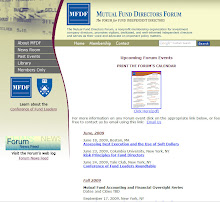In a recent article, Knowledge@Wharton, the Wharton School's online business journal, highlighted a paper entitled, "Payoff Complementarities and Financial Fragility -- Evidence from Mutual Fund Outflows," authored by Wharton finance professor Itay Goldstein and coauthors Qi Chen, from Duke University's Fuqua School of Business, and Wei Jiang, from the Graduate School of Business at Columbia University. The paper examines financial fragility, and the reasearch focuses specifically on mutual funds because their structure provides a method of studying and measuring financial fragility.
The researchers analyzed outflow data on U.S. equity mutual funds from 1995 to 2005 and found, among other things, that outflows from these funds, in which portfolio assets could not easily be liquidated to meet redemptions, were more sensitive to periods of poor performance than other mutual funds with more liquid assets. In other words, investors in funds with less liquid portfolios are more likely to redeem their shares in the wake of negative performance compared to investors in funds with more liquid portfolios. The Knowledge@Wharton article explains:
"When a fund holds stocks that have liquid, or high trading volumes, it is easier [for fund managers] to execute large trades without a significant adverse price impact," states [Itay] Goldstein. "In that case, the fund is better able to accommodate outflows without hurting the value for the remaining shareholders."
He says existing studies indicate that on average, so-called "forced trading" reduces a fund's return by 2.2%. "Obviously, for illiquid assets, forced trading is likely to cause more damage. Moreover, for unusually large redemptions, the proportion of redemptions that leads to forced trading is also likely to be larger" than those current studies estimate.
"Because complementarities are stronger for illiquid funds than for liquid funds, a decrease in performance in illiquid funds has a larger effect on outflows," says Goldstein. "Essentially, the complementarities that come with redemptions in response to poor performance have a feedback effect that amplifies outflows in illiquid funds."
The Knowledge@Wharton piece provides a more detailed discussion of the paper and its conclusions. The paper itself makes interesting and thought provoking reading, not just for its conclusions about financial fragility, but also in its use of the mutual fund industry as a proxy for this phenomenon.
The Knowledge@Wharton piece, "On the Run: Examining Patterns in Mutual Fund Redemptions" is available at: http://knowledge.wharton.upenn.edu/article.cfm?articleid=2133
The Goldstein, Chen, and Jiang paper, "Payoff Complementarities and Financial Fragility -- Evidence from Mutual Fund Outflows," is available at: http://fic.wharton.upenn.edu/fic/papers/07/0716.pdf





